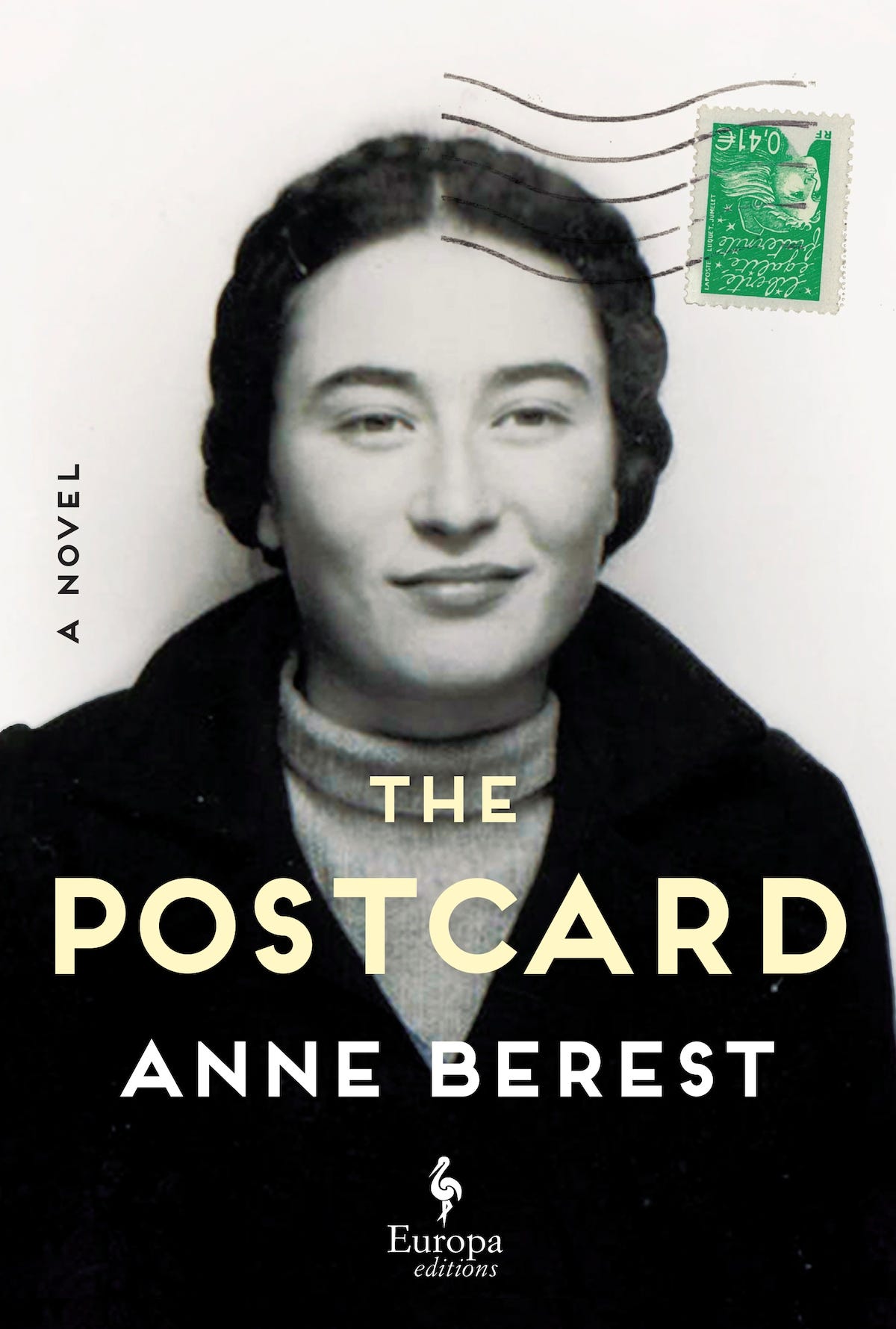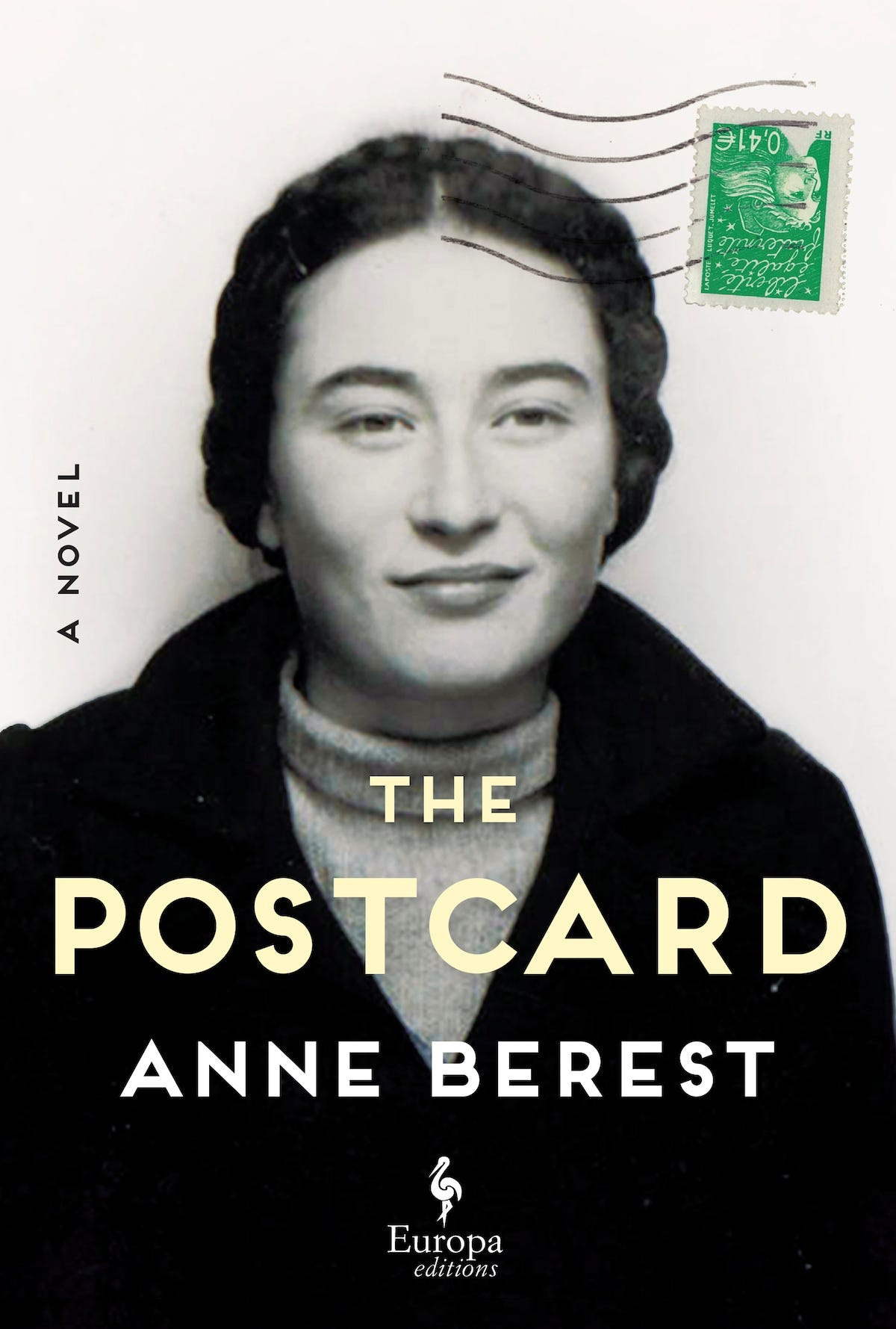Good evening, and happy 2025!
I’ve been battling a terrible cold since I got back from the holidays in Europe, so I only finished one (but exceptional!) book this past week — The Postcard by Anne Berest. Let’s get into it.
What I read:
The Postcard by Anne Berest
In The Postcard, Ann Berest weaves her family history into a work of auto-historical fiction. While it is based on the true story of Berest’s family, she uses fiction to fill in the story where the historical record fails. Originally published in French, The Postcard was translated into English in 2023. It spans four generations and takes place in Russia, Latvia, Palestine, and France.
The novel opens in Paris in 2003, when Anne’s mother, Léila, receives an anonymous postcard with four names written on it — Ephraïm, Emma, Noémie, and Jacques. They are, respectively, Léila’s grandfather, grandmother, aunt, and uncle, and all four people died at Auschwitz. Myriam, Léila’s mother, was the sole surviving member of the family of five. Léila is horrified: “Who could have sent me this terrible thing?”
Fifteen years later, Anne has an uncomfortable conversation over Passover. Anne, who is unfamiliar with Jewish practices, recently began dating Georges, an observant Jewish man, and attends the dinner with him. Georges mentions to the other guests that Anne’s daughter was told by her classmates that “we don’t like Jews here.” When asked how she responded, Anne discloses that she had not addressed the incident. Another dinner guest accuses her of being Jewish “only when it suits.”
Spurred by this interaction, Anne sets out to uncover who sent the postcard. She works with her mother, a private detective, and many others to trace her relatives’ journey. The first part of the book primarily focuses on Ephraïm and Emma Rabinovitch. They fled Russia in 1919 during the revolution with Myriam. They moved first to Latvia, where they had Noémie, and then to Palestine before relocating to France in 1929, where they had Jacques. They lived in France until all but Myriam were deported to Auschwitz in 1942.
The second part of the book centers on Myriam, the only family member who was not sent to Auschwitz. When the police come to take Noémie and Jacques, Myriam’s name is not on their list. Ephraïm quickly tells his daughter to hide, and Myriam’s husband later helps her escape Vichy France. Myriam worked for the French Resistance during the war in Free France.
The Postcard is beautifully written and meticulously researched. Berest tells her family’s story with care. She deftly weaves between timelines, and the present-day timeline reads almost like a detective story that is hard to put down. But this book is more than just a mystery. In the present, Anne grapples with her identity, inherited trauma, and how we can try to understand what we have not personally experienced. The true danger is not forgetting the past but being indifferent to it. This book blew me away, and I highly recommend it.
Rating: 4.5/5
Genre: Historical Fiction/Memoir
Page count: 464 pages
Audio: 13 hours 6 minutes
Articles and TV shows I can’t stop thinking about:
“It’s Called a Premortem—and It’s the Most Productive Thing You’ll Do All Year” - Wall Street Journal
I have not gotten to New Year’s resolutions quite yet, but I love this annual ritual. Ron Shaich asks himself: “What can I do in the next three to five years that I will respect looking back from my deathbed?”
“Ukrainian Sniper Breaks Cover to Claim World-Record Hit of More Than 2 Miles” - Wall Street Journal
After finishing the Day of the Jackal TV series, I read this article about the world record for a sniper hit. Astonishingly, the sniper is a 58-year-old Ukrainian former businessman who joined the Ukrainian army after Russia invaded.
Where Michelin-Starred Restaurants Get Ingredients - Business Insider
I randomly watched this Business Insider compilation of where Michelin-starred restaurants source their ingredients from. It covers red uni from Santa Barbara, sturgeon caviar from Madagascar, and $45,000 honeydew melons from Japan. I highly recommend it (although the best videos are at the beginning).
“Read the lawsuit Justin Baldoni filed against The New York Times over its bombshell Blake Lively story” - Business Insider
The Justin Baldoni-Blake Lively-This Ends with Us drama continues. Both parties have filed complaints. Lively filed first with the California Civil Rights Department, alleging that Baldoni orchestrated a campaign to retaliate against her for speaking up about sexual misconduct. The complaint included screenshots of incriminating text messages between Baldoni and his PR team that indicated they were planting stories.
Baldoni filed a complaint this week against The New York Times for its December article leaking Lively’s complaint. He is accusing the NYT of libel, false light invasion of privacy, promissory fraud, and breach of implied-in-fact contract. He has included many of the same texts Lively had but with additional messages that suggest that the PR team was joking about planting the stories.
I ended up reading both of these complaints in full (again, I’m sick), and they are wild. I’m fascinated to see what happens with Baldoni’s NYT complaint.









